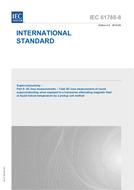Click here to purchase
IEC 61788-8:2010(E) specifies the measurement method of total AC losses by the pickup coil method in composite superconducting wires exposed to a transverse alternating magnetic field. The losses may contain hysteresis, coupling and eddy current losses. The standard method to measure only the hysteresis loss in DC or low-sweep-rate magnetic field is specified in IEC 61788-13. In metallic and oxide round superconducting wires expected to be mainly used for pulsed coil and AC coil applications, AC loss is generated by the application of time-varying magnetic field and/or current. The contribution of the magnetic field to the AC loss is predominant in usual electromagnetic configurations of the coil applications. For the superconducting wires exposed to a transverse alternating magnetic field, the present method can be generally used in measurements of the total AC loss in a wide range of frequency up to the commercial level, 50/60 Hz, at liquid helium temperature. For the superconducting wires with fine filaments, the AC loss measured with the present method can be divided into the hysteresis loss in the individual filaments, the coupling loss among the filaments and the eddy current loss in the normal conducting parts. In cases where the wires do not have a thick outer normal conducting sheath, the main components are the hysteresis loss and the coupling loss by estimating the former part as an extrapolated level of the AC loss per cycle to zero frequency in the region of lower frequency, where the coupling loss per cycle is proportional to the frequency. This second edition cancels and replaces the first edition published in 2003. This edition constitutes a technical revision. The main changes with respect to the previous edition are listed below:
– extending the applications of the pickup coil method to the a.c. loss measurements in metallic and oxide superconducting wires with a round cross section at liquid helium temperature,
– using the word “uncertainty” for all quantitative (associated with a number) statistical expressions and eliminating the quantitative use of “precision” and “accuracy”.
Product Details
- Edition:
- 2.0
- Published:
- 06/24/2010
- Number of Pages:
- 34
- File Size:
- 1 file , 1.5 MB
